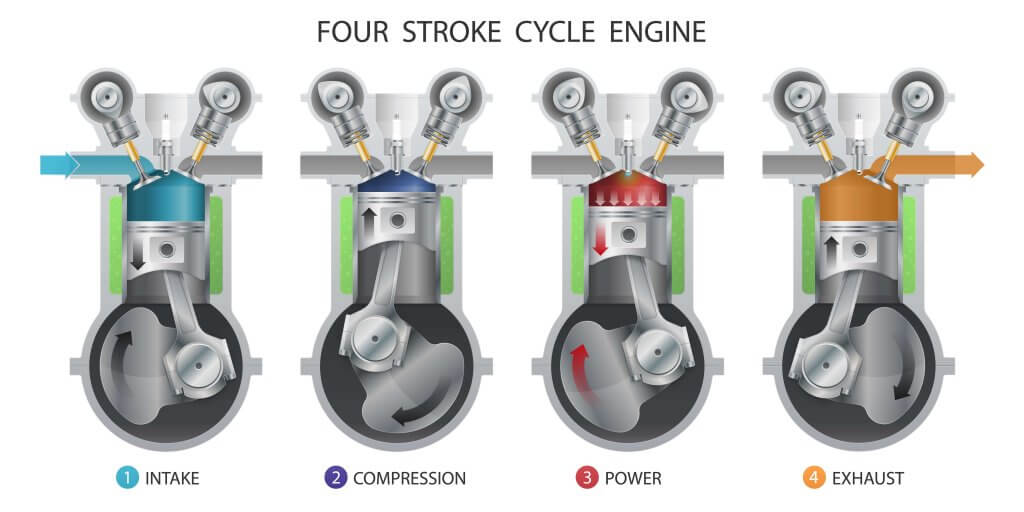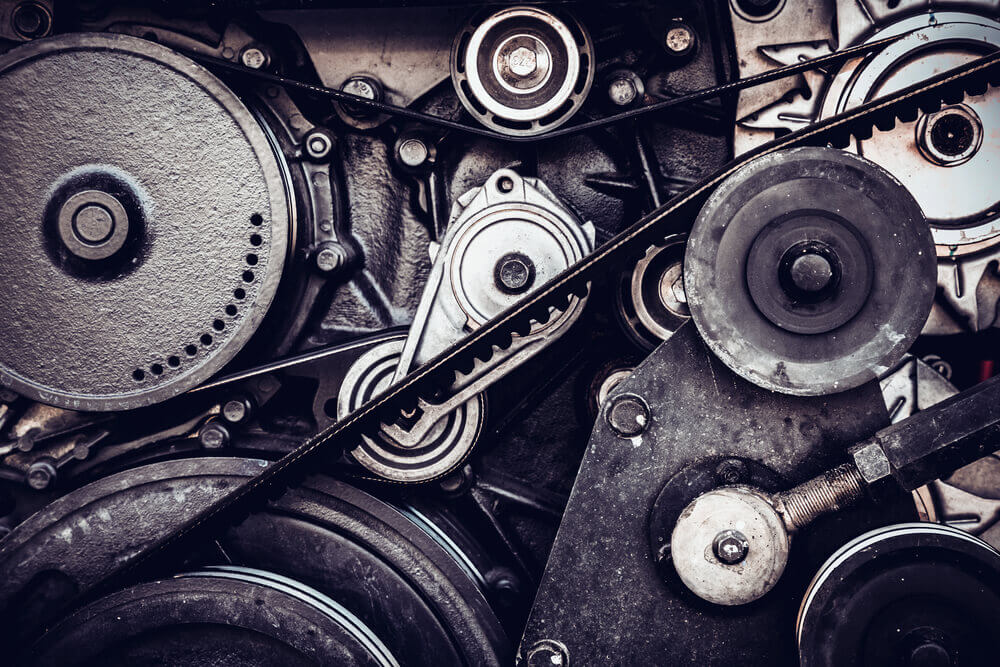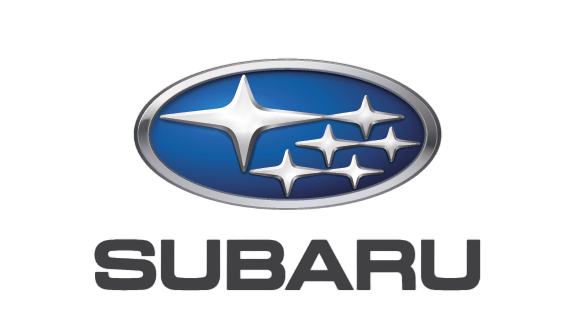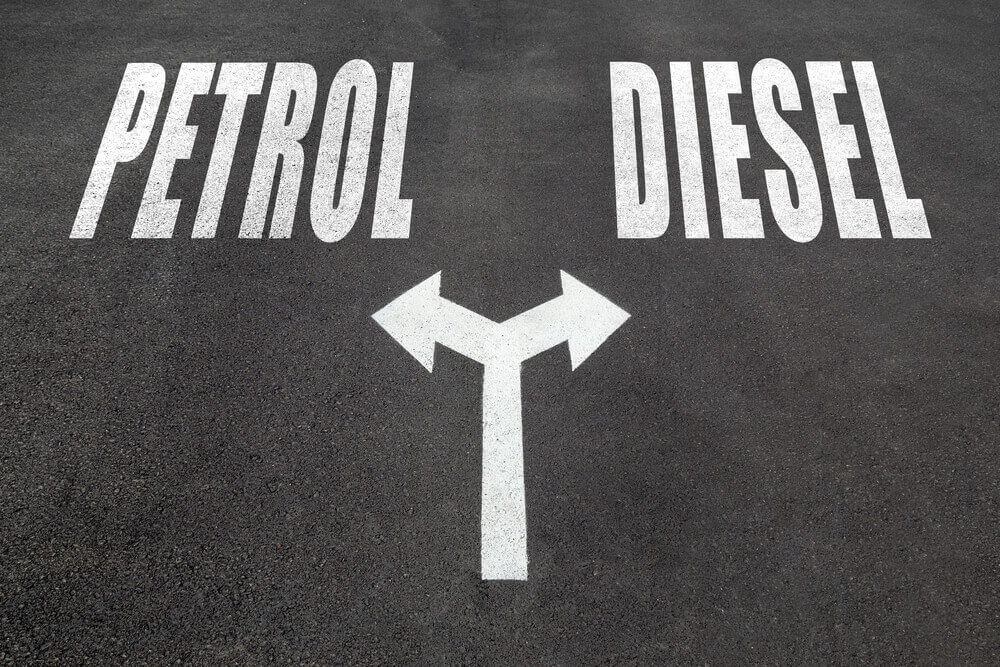Times are changing. The diesel vs petrol debate has probably taken on new dimensions since you were last pondering the difference between the two at the servo. You’ve probably already bought shares in that electric vehicle company or invested in lithium. But let’s take a step back for a minute.
What’s up with the difference between petrol vs diesel – what’s changed and which one is better?
Let’s take a closer look.
What are diesel and petrol engines?

Four Stroke diesel and petrol engines
Petrol and diesel are two different types of fuel that power engines. Unless you’re driving an EV, chances are your car runs on petrol or diesel.
Diesel and petrol engines work on the same fundamental principle, with a few minor – yet key – differences. Not only do diesel and petrol engines drink different fuels, but they also burn fuel differently. If you’re still scratching your head don’t worry, we’ll explain everything in detail.
Diesel vs petrol engines – how do they work?
Both combustion engines follow a similar two or four-stroke cycle consisting of four key phases: intake, compression, power and exhaust.
- Intake – air is sucked into the cylinder via the intake valve which opens momentarily.
- Compression – the intake valve closes as the air is compressed. A drop of fuel is inserted via the fuel injector.
- Power – the compressed air and fuel are ignited causing a small yet powerful explosion that drives the piston downward turning the drive shaft making the car move forward or backward.
- Exhaust – The used mixture of air and fuel is flushed out of the cylinder via the exhaust valve. The system is now ready to fill up with air again and restart the cycle.
How are petrol and diesel engines different?
Diesel and petrol engines have one key difference – instead of using spark plugs like petrol engines, diesel engines rely exclusively on compressed air.
The man himself, Rudolf Diesel, discovered that if the air was compressed enough it would cause the ignition of diesel fuel without the use of a spark plug. The compression phase of the combustion cycle, therefore, looks a bit different in a diesel engine. The air in a diesel must be compressed between 14 and 23 times its original volume – far less than in a petrol engine which relies on the spark plug to cause the ignition.
Diesel vs Petrol – which one is better?

Different systems and different fuels – you might be wondering which one has better fuel consumption or lower costs. The answer isn’t exactly as straightforward as you might like.
Here are the pros and cons of diesel vs petrol engines:
Diesel Engine Pros and Cons
Diesel engines: pros
- Diesel engines are often considered more efficient than their petrol counterparts.
- Diesel engines are considered to be expressly tough as they are built to withstand extreme pressure during the compression phase. This can result in longer intervals between maintenance.
- Diesel engines are often compatible with biofuels such as vegetable oil and therefore offer consumers a wider choice of fuels compared to petrol equivalents.
Diesel engines: cons
- Diesel engines are often more costly to produce due to the extra effort that goes into creating an engine capable of withstanding the forces unleashed by the compression of gases in the internal combustion cylinder.
- Diesel engines are often heavier than petrol vehicles making them less desirable in performance cars.
- Diesel engines can sometimes struggle to start in colder temperatures because they rely on extremely hot compressed air to ignite the fuel.
- Diesel engines can often produce a lot more noise due to the way they function. This can make for a less refined ride.
Petrol Engine Pros and Cons
Petrol engines: pros
- Petrol cars are far cheaper than diesel-engined cars. This alone makes them the more attractive option for anyone wanting to save on a new car.
- Petrol engines are often far more powerful than diesel engines. Petrol engines can also host engine enhancements like turbochargers to produce even more power on demand.
- Petrol engines are quieter and smoother to drive – if you’re all about performance speed then petrol engines are more suited to fulfil your driving needs.
- Maintenance and upkeep are cheaper than a diesel engine. Petrol engines are more common and parts are easily available if something goes wrong.
- Petrol engines, if maintained appropriately, have better fuel economy and emit fewer emissions than diesel models.
- When it comes to variety, petrol engines offer a wider range of car types from sports cars to hatchbacks to name a few.
- Petrol engines cope better in cooler climates where a spark plug ignition system won’t fail.
Petrol engines: cons
- Petrol engines are usually less fuel-efficient – making longer drives more costly. If you plan on taking longer trips and value fuel economy, you might want to consider a diesel vehicle.
- Petrol cars are known to depreciate faster than diesel cars making them a less viable long term investment for some buyers.
- Petrol engines are not ideally suited to larger vehicles such as SUVs, vans and trucks.
Petrol vs diesel – what’s beyond?
With the growth of EVs and hybrids, car manufacturers like Subaru are saying farewell to diesel models globally and looking to bolster up more efficient petrol and electric versions of previously-diesel engined cars.
Here at City Subaru Perth, we’re here to answer any questions you may have about which type of car is right for you. Curious about what cars will be hitting the roads in 2022? Come down and test drive our new range of Subaru vehicles. Just reach out online or give our friendly team a call today.

